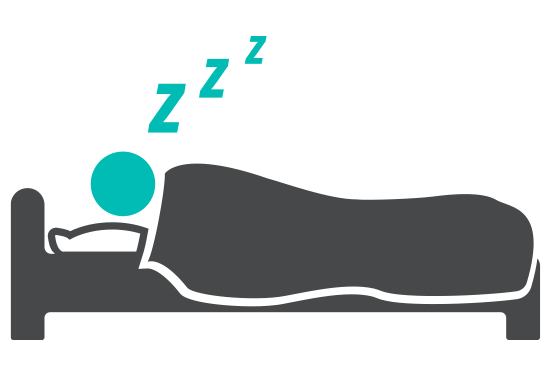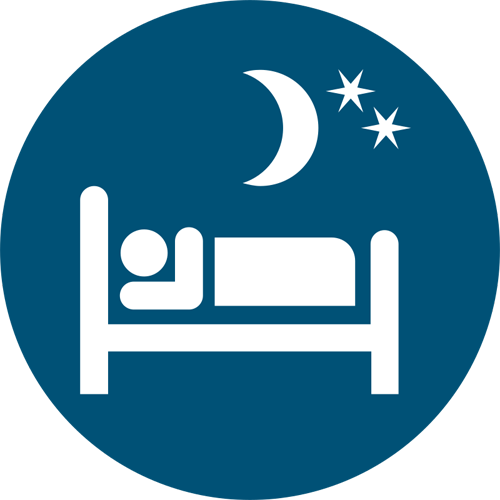
Sleep Quality and its Impact on Weight Management, Quality of Life, and Wellness
Feel like you’re not getting enough sleep at night — and suffering as a result? It’s not just you. About a third of adults in the United States experience a chronic lack of sleep, according to the Centers for Disease Control and Prevention, getting less than seven hours of sleep each night on a regular basis.
While you might brush off a tough night of sleep here and there, insufficient sleep is a serious issue that can lead to a number of chronic health conditions over the long term. These include obesity, high blood pressure, diabetes, stroke, and frequent mental distress.
And each day that you wake up short on sleep, you’re at a disadvantage both physically and mentally. You may struggle with cognitive issues such as concentration, memory, making decisions, and problem solving. You’re at a greater risk of getting sick, making poor food choices, and even getting into accidents.
Overall, life is better when you’re able to sleep well. You can face each day fresh, well rested, and ready take on challenges with energy and mental clarity. You can even reduce your risk of developing some serious health conditions.
Sleep Quality and Weight Management
Making sleep a priority can support a healthy lifestyle and help you make good choices when it comes to food and activity. Sleep can have an influence on self control, food choices, and even the hormones related to weight gain.
You might struggle with self control when you’re short on sleep, according to a study published in the American Journal of Clinical Nutrition. The study found that when you’re sleep deprived, you’re more likely to snack late at night and eat snacks high in carbohydrates.
Additionally, a study published in Appetite found that when you sleep less than five hours each night, your nutrition really takes a nosedive. At that level of sleep deprivation, you’re more likely to consume more calories, less water, and more carbohydrates overall.
On top of struggling with food choices when you’re sleep deprived, you’ll likely feel short on energy. Think you’re going to make it to the gym when all you want to do is nap? It’s possible, but you may struggle to even show up, and if you do, you may have a hard time giving your workout your full effort.
Support Sleep and a Healthy Weight
Life can make healthy sleep feel impossible, but it isn’t. We all have our excuses, but anyone can make a commitment to improving sleep and with it, improving overall health and wellness.
Don’t let excuses get in the way of the sleep you need. We all deal with the demands of daily life, whether it’s work, family responsibilities, school, or other priorities. But your first priority is your health, because without your health, everything else suffers.
Block out time for sleep, and make it your top priority. Plan what time you need to get up in the morning and count backwards from there, giving yourself seven to nine hours of time to rest each night. Schedule life around sleep, not the other way around.
For some people, sleep struggles are more than a question of scheduling and priorities. If you have a sleep disorder, you may have a hard time getting the rest you need, even if you give yourself enough time. It’s essential to manage sleep disorders with treatment. Talk to your doctor about how your sleep disorder is affecting your life and health, and get suggestions for treatment that can alleviate the condition.
Stick to healthy sleep habits. Late night screen time, eating heavy meals before bed, even drinking alcohol late at night can negatively influence the quality and quantity of your sleep. Stick to a consistent sleep schedule and bedtime routine, and avoid the major pitfalls that can sabotage your healthy sleep.
Make sure your bedroom is healthy for sleep, with a mattress that offers appropriate support, and bedding that feels comfortable. Your bedroom should be a haven for relaxation, and kept clean, dark, quiet, cool, and comfortable.
Understand that if you’re dieting, some diets can have an effect on your sleep. Many popular diets restrict carbohydrates, such as paleo or low carb diets. These diets can cause temporary insomnia, because normally, carbohydrates can help you sleep easier. You might be fine just to push through the temporary insomnia for a few days as you settle in to your diet, but if it persists for several days, you may need to reintroduce carbs.
There are many ways to help yourself feel better, but without sleep, your efforts may be futile. Commit to healthy sleep for a healthier lifestyle and improved wellness. You can support healthy habits with healthy sleep, and improve your ability to feel good both physically and mentally.
Amy Highland is a sleep expert at SleepHelp.org. She loves taking naps during thunderstorms and cuddling up with a blanket, book, and cat.


Are you still offering the grant for weightloss surgery?
We request that you attend a ZOOM informational meeting for the specifics of our grant program. Please send a request to attend a ZOOM meeting to: info@wlsfa.org